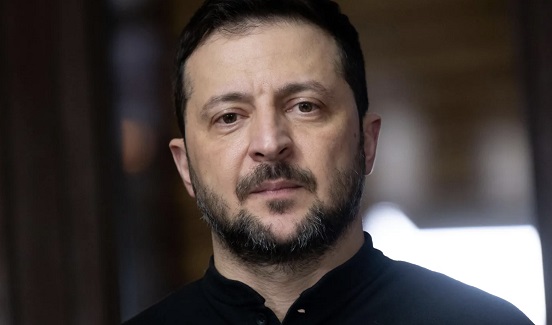European leaders are set to gather next week for an emergency summit on the war in Ukraine, in response to concerns the US is moving ahead with Russia on peace talks that will lock out the continent.
Sir Keir Starmer, who is expected to attend the summit in Paris, said it was a "once-in-a-generation moment for our national security" and it was clear Europe must take a greater role in Nato.
It comes after Donald Trump's special envoy to Ukraine said European leaders would be consulted but not take part in any talks between US and Russia over ending the war.
Senior White House figures, including US Secretary of State Marco Rubio, are due to meet Russian negotiators in Saudi Arabia in the coming days. US officials said that Ukraine was also invited - although President Volodymyr Zelensky says his country has received no such invitation.
In remarks likely to raise concern in Ukraine and among European allies, special envoy Keith Kellogg said previous negotiations had failed because too many parties had been involved.
"It may be like chalk on the blackboard, it may grate a little bit, but I am telling you something that is really quite honest," he said on Saturday.
Europe remains haunted by the Minsk agreements, a failed ceasefire deal between Ukraine and Russia reached in 2015. The talks, which were brokered by France and Germany, sought to end fighting in the Donbas region of eastern Ukraine.
Sir Keir is understood to see his role as bringing US and Europe together to ensure a united approach to peace in Ukraine.
The UK prime minister will discuss the views of European leaders when he visits US President Trump at the White House at the end of this month.
A further meeting of European leaders together with Zelensky is expected after Sir Keir returns from Washington.
Sir Keir said the UK would "work to ensure we keep the US and Europe together", adding the two could not "allow any divisions in the alliance to distract" from "external enemies".
"This is a once in a generation moment for our national security where we engage with the reality of the world today and the threat we face from Russia," he said.
"It's clear Europe must take on a greater role in Nato as we work with the United States to secure Ukraine's future and face down the threat we face from Russia."
Polish foreign minister Radoslaw Sikorski said Emmanuel Macron had called the summit of European leaders, which has not yet been announced by the French president.
Sikorski said: "President Trump has a method of operating, which the Russians call reconnaissance through battle. You push and you see what happens, and then you change your position, legitimate tactics. And we need to respond."
Earlier on Saturday, Zelensky called for the creation of an "army of Europe" amid rising concern the US may no longer come to the continent's aid.
Speaking at the Munich Security Conference, he said US Vice-President JD Vance's speech at the event had made it clear that the old relationship between Europe and America was "ending" and the continent "needs to adjust to that".
But Zelensky also said Ukraine would "never accept deals made behind our backs without our involvement" after Trump and Russian President Vladimir Putin agreed to start peace talks.
Earlier this week the US president announced he had a lengthy phone conversation with the Russian leader and that negotiations to stop the "ridiculous war" in Ukraine would begin "immediately".
Trump then "informed" Zelensky of his plan.
Trump appeared confident that his leadership style could pave the way for a peace deal in Ukraine.
His rapprochement with Putin brought to an end more than three years of silence between Moscow and Washington.
Trump's shock announcement rekindled memories of his meeting with Putin in Helsinki back in 2018.
The two men held nearly two hours of closed-door talks in the Finnish capital and went on to deliver a joint news conference, where Trump defended Russia over claims of interference in the 2016 US presidential election.
His comments came despite US intelligence agencies concluding, in 2016, that Russia was behind an effort to tip the scale of the US election against Hillary Clinton, with a state-authorised campaign of cyber attacks and fake news stories planted on social media.
On Saturday, US Secretary of State Marco Rubio also held a phone call with Russia's foreign minister "building on" the 12 February call between Trump and Putin.
Senior officials from the Trump administration will start peace talks with Russian and Ukrainian negotiators in Saudi Arabia in the coming days, US Representative Michael McCaul told Reuters news agency.
McCaul, chairman of the House Foreign Affairs Committee, said he understood Zelensky had been invited to take part in the Saudi talks, which were aimed at arranging a meeting with Trump, Putin and the Ukrainian president "to finally bring peace and end this conflict".
A day earlier, Vance had launched a scalding attack on European democracies, saying the greatest threat facing the continent was not from Russia and China, but "from within".
In a speech at the Munich Security Conference, he repeated the Trump administration's line that Europe must "step up in a big way to provide for its own defence".
David Lammy has said the UK and EU countries must spend more on defence, with Europe facing an "existential question" even in the event of a negotiated peace in Ukraine.
The UK foreign secretary told the Munich Security Conference on Saturday "Putin will not go away", and that, while it was positive 23 Nato countries were now spending at least 2% of their GDP on defence, "we all know we have to go upward".
BBC





